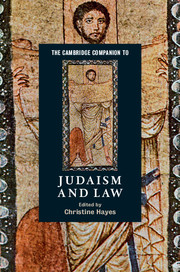Book contents
- The Cambridge Companion to Judaism and Law
- Cambridge Companions to Religion
- The Cambridge Companion to Judaism and Law
- Copyright page
- Contents
- Contributors
- Acknowledgments
- Introduction: Can We Even Speak of “Judaism and Law”?
- Part I Law as Constitutive of Biblical and Premodern Jewish Religious Expression
- Part II Enlightenment, Emancipation, and the Invention of Jewish “Religion”
- Part III Judaism and the Secular Jewish State
- 11 Judaism and Jewish Law in Pre-State Palestine
- 12 Judaism, Jewish Law, and the Jewish State in Israel
- 13 What Does It Mean for a State to Be Jewish?
- 14 Fault Lines
- Index
- Cambridge Companions to Religion (continued from page iii)
- References
11 - Judaism and Jewish Law in Pre-State Palestine
from Part III - Judaism and the Secular Jewish State
Published online by Cambridge University Press: 23 February 2017
- The Cambridge Companion to Judaism and Law
- Cambridge Companions to Religion
- The Cambridge Companion to Judaism and Law
- Copyright page
- Contents
- Contributors
- Acknowledgments
- Introduction: Can We Even Speak of “Judaism and Law”?
- Part I Law as Constitutive of Biblical and Premodern Jewish Religious Expression
- Part II Enlightenment, Emancipation, and the Invention of Jewish “Religion”
- Part III Judaism and the Secular Jewish State
- 11 Judaism and Jewish Law in Pre-State Palestine
- 12 Judaism, Jewish Law, and the Jewish State in Israel
- 13 What Does It Mean for a State to Be Jewish?
- 14 Fault Lines
- Index
- Cambridge Companions to Religion (continued from page iii)
- References
- Type
- Chapter
- Information
- The Cambridge Companion to Judaism and Law , pp. 317 - 336Publisher: Cambridge University PressPrint publication year: 2017



